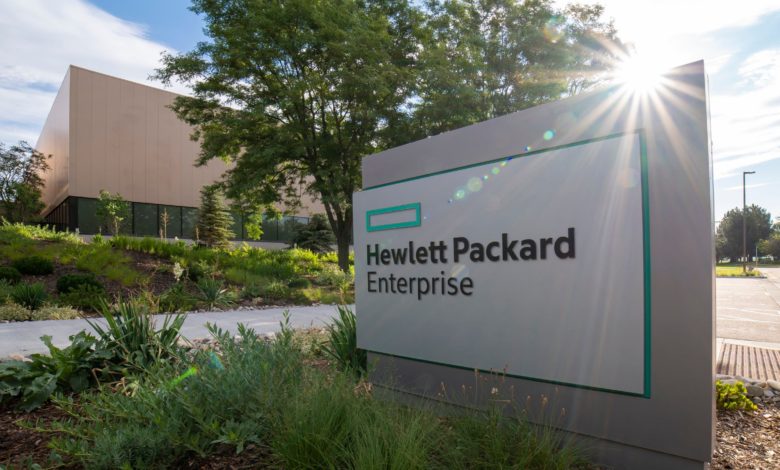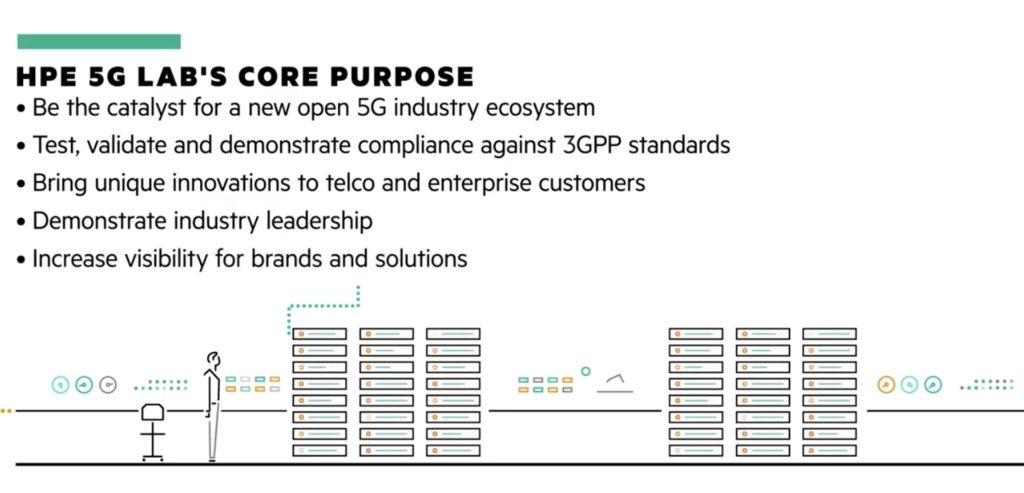
Hewlett Packard Enterprise (HPE) today unveiled in a company press release the HPE 5G Lab, a test and development environment where telecommunication (telcos) clients and partners can validate and integrate 5G network solutions into existing systems.
HPE claims that by using the 5G Lab, telcos customers and partners can expect to speed up their 5G adoption and access new revenues faster by getting hands-on experience with the latest 5G innovations in a live test environment.
“Governments and telecoms operators around the world are looking to open 5G technologies as an opportunity to move away from a number of vendors which have raised fundamental concerns around security, resilience and market diversification,” said Phil Mottram, vice president and general manager of Communications and Media Solutions at HPE. “However, despite multiple successful deployments, doubts still persist about the ability of open 5G technologies to truly replace the old way of building networks. With the launch of the HPE 5G Lab, telcos, solution vendors and national stakeholders can test innovative new solutions with confidence and ensure that they are ready for mass adoption.”
5G is becoming an increasingly quicker rolled out capability that is aiming to improve peoples’ and businesses’ lives with HPE’s 5G portfolio showing the potential of 5G at a network core, at the edge, and in an enterprise.
With countries jumping on board with the adoption of 5G due to it’s already visible benefits, suppliers and partners of the telco market are making sure they can offer support with the infrastructure.
A recent example of this is Samsung Electronics announcing its successful demonstration of a drone-based antenna configuration measurement solution for 4G and 5G networks.
Some businesses have taken the approach to make acquisitions in order to improve their 5G capabilities with Verizon acquiring the cloud-based video conferencing BlueJeans Network to expand its 5G portfolio.
Alex Quach, Intel VP and GM at Wireline and Core Network commented that they aim to help their customers with the delivery and deployment of their 5G solutions: “The promise of open 5G innovations will only happen through strong industry collaboration. Through our work with the ecosystem, such as efforts with HPE in their 5G labs on Intel Xeon Scalable processor-based HPE Telco Blueprints, and continued investment in our unmatched 5G network infrastructure portfolio, we aim to help our customers accelerate the delivery and deployment of their 5G solutions from core to edge.”
The freshly introduced HPE 5G Lab provides a proving ground enabling telcos, network equipment providers, and independent software vendors (ISVs) to validate these technologies, prepare for mass adoption, and invest with increased accuracy and details.
HPE claims that the 5G standards have been designed in a way that allows telcos to build their 5G networks with open, cloud-native platforms that can utilise modular software and hardware components from different vendors, giving telcos the possibility to deploy 5G services faster, more securely, and in a more flexible way.
Amit Tiwari, Chief Strategic Alliances Officer at Affirmed Networks explained why they’re welcoming HPE’s initiative by saying: “We at Affirmed Networks believe a cloud-native architecture that drives today’s always-on networks at the highest levels of performance and availability is key to the rapid adoption of 5G use cases. HPE’s initiative by creating this multi-vendor, open ecosystem for the best of technology providers to pre-integrate their solutions is a welcome step towards accelerating the drive to mass scale deployment and monetization of 5G networks.”

HPE 5G Lab encourages telcos, vendors, and platform providers to come together to test, document, and validate their technologies as a single solution by using an open approach that provides the flexibility to work with practically any ISV or best-of-breed solution provider.
By telcos, vendors, and platform providers working together they are capable of creating what HPE claims to be a network solution that can be tailored to specific verticals and use cases in a live real-time test environment.
The HPE 5G Lab has gained support from a number of globally recognised brands within the telecoms market including Affirmed Networks, Casa Systems, Intel, JMA Wireless, Metaswitch, Nokia, Openet, and Red Hat.
Niall Byrne, the VP for Network Strategy at Openet mentioned how they’re proud to be working with HPE: “Open systems are key to 5G. Openet is very proud to work with HPE and their 5G partners in the HPE 5G Lab to show how a best of breed, open systems approach is the best way to deliver 5G networks and supporting ecosystems.”
HPE is well placed to deliver 5G solutions to telcos with over 30 years of experience in the telecoms industry and more than 300 telco customers in 160 countries.
HPE claims that 700 million subscribers across 82 carriers currently depend on HPE Mobile Core software and partly as a result of this HPE was the recipient of the 2019 Global 5G Infrastructure Enabling Technology Award by Frost & Sullivan.
HPE has welcomed three 5G related products and solutions already this year including HPE 5G Core Stack, the HPE Resource Aggregator for Open Distributed Infrastructure Management, and HPE Edge Orchestrator.
Shubh Agarwal, SVP for 5G at Metaswitch explained how HPE’s 5G Lab is set to provide added value for their business and their customers by saying: “Metaswitch’s Fusion Core 5G Container Network Functions (CNFs) are built to work via open APIs with complementary CNFs, Kubernetes based automation platforms and cloud infrastructures. The HPE 5G Lab provides an important proof point for service providers and enterprises looking to explore elements of the 5G SBA and accelerate telco cloud adoption, something that will be vital for 5G networks to hit the price/performance targets and drive rapid service innovation.”
The initial focus with HPE’s 5G Lab will be different to the previous three 5G related products and solutions and will aim to bring innovation to the previously monolithic cellular network core.
This will be to allow users to fully realise the benefits and power of 5G by enabling holistic management, data sharing, and slicing into virtual 5G networks with dedicated usage and characteristics.
Jerry Guo, CEO at Casa Systems mentioned why 5G will be the foundation of a new generation and why they’re excited to be a founding partner of the HPE 5G Lab by saying: “From edge computing to massive IoT deployments, VR / AR and more, 5G will be the foundation of a new generation of communications, managed services and applications for consumers and businesses. A key to making it a reality is the shift by telcos from being locked into proprietary, vertically-integrated networks from monolithic vendors to the new model of open, cloud-native, and multi-vendor 5G solutions. As proven by some of our demonstrations and technical trials with leading telcos, this approach leads to more flexible, agile and cost-effective 5G networks so we are excited to be a founding partner of the HPE 5G Lab to collaborate with HPE, telcos and other leading vendors on 5G solutions.”
The HPE 5G Lab is based around HPE 5G portfolio solutions and will include multiple 5G related existing products and solutions which include the HPE 5G Core Stack, HPE Telco Cloud, HPE Telco Blueprints for Core and Edge, and Aruba networking equipment.
The HPE 5G Core Stack takes a fully open approach, allowing telcos to swap out network functions (NFs) as needed and therefore “stay nimble” and ahead of their 5G competition.
Darrell Jordan-Smith, global vice president of vertical industries and accounts at Red Hat commented why they’re excited to continue their work with HPE to advance open source technologies and principals by saying: “Red Hat is excited to continue our work with HPE to advance open source technologies and principles to help organizations look to deploy their next-generation 5G networks. With the integration of our industry-leading container platform, Red Hat OpenShift, to the HPE 5G Core Stack and the new HPE 5G Lab, businesses can be empowered to test, innovate and build on an open cloud-native infrastructure.”
To access the HPE 5G Lab and achieve validation with the 5G Core Stack, ISVs will first need to join the HPE Partner Ready program.
By joining the HPE Partner Ready programme it will allow ISVs to demonstrate compliance with 3GPP standards and benefit from HPE’s growing 5G ecosystem which includes HPE’s global salesforce, go-to-market support, and innovative delivery models through HPE GreenLake and HPE Financial Services.

The HPE 5G Lab enables telcos to test and validate multiple NFs from different vendors whilst relying on HPE for integration with the HPE 5G Core Stack.
With HPE GreenLake, telcos can acquire an end-to-end 5G core network as a pre-integrated software and hardware platform on an as-a-service consumption model.
HPE claims that by deploying their HPE 5G Core Stack with HPE GreenLake, carriers can acquire a purpose-built open platform for 5G with minimal up-front investment, the ability to scale according to demand, can be ready to support unpredictable growth, and future-proof themselves for forthcoming 5G evolutions.
HPE and partners have previously showcased a number of successful cloud-native, multi-vendor 5G core deployments, such as those demonstrated in Korea for a cloud-native 5G standalone and in France for successfully demonstrating 5G network slicing together.
The HPE 5G Lab is currently available worldwide to customers and HPE partners via remote access and includes the provision of personnel to manage and operate the lab environment, as well as assist with integration and testing.



